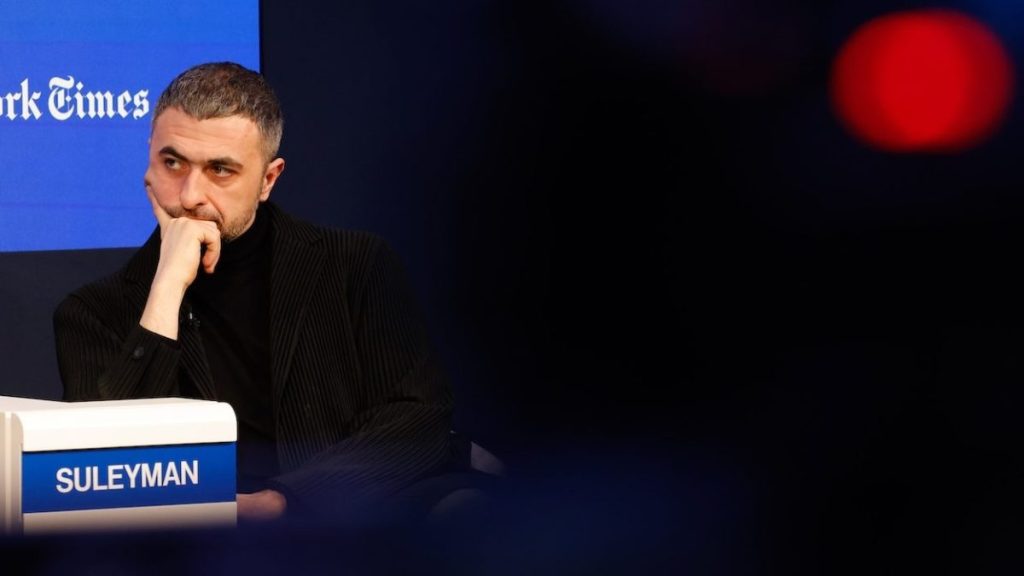UK Launches Regulatory Probe into Microsoft’s Inflection AI Hiring

Microsoft is currently under a regulatory microscope in the UK. The Competition and Markets Authority (CMA) has launched a “phase 1” merger inquiry after the tech giant hired the core team behind Inflection AI. This move has raised concerns about potential “quasi-mergers” and the impact on competition.
The inquiry comes just months after Microsoft established a new AI division, led by Inflection AI’s founders. As the CMA delves deeper, the tech world watches closely, anticipating the potential implications for the AI industry. How will this scrutiny affect future mergers and acquisitions? Only time will tell.
UK regulatory probe on Microsoft
Microsoft is now under a full regulatory probe in the UK. The tech giant recently hired the core team behind Inflection AI, a company they previously invested in. This move sparked a “phase 1” merger inquiry by the UK Government’s Competition and Markets Authority (CMA). The CMA has 40 working days to investigate and decide whether to proceed with a more in-depth probe.
The probe was expected, given that the CMA had already shown interest in Microsoft’s activities. The CMA is concerned about big tech companies using strategies to avoid regulatory scrutiny in AI-related mergers and acquisitions. One such strategy is dubbed a “quasi-merger,” which can include various approaches from strategic investments to hiring startup founders and technical talent.
Background on Inflection AI and Microsoft’s New AI Division
Four months ago, Microsoft CEO Satya Nadella announced the creation of a new consumer AI division. This division is spearheaded by the founders of Inflection AI, including deep learning scientist Karén Simonyan and Google DeepMind co-founder Mustafa Suleyman. Additionally, several other members from Inflection AI joined this new unit, with Jordan Hoffmann now leading Microsoft’s UK AI hub in London.
The hiring of the Inflection AI team has raised eyebrows. The CMA now needs to determine if this constitutes a “merger” and, if so, whether it might harm competition in the UK. The decision will significantly impact Microsoft’s operations and future AI endeavors in the UK.
Previous Investigations by the CMA
This isn’t the CMA’s first rodeo with AI-related concerns. The authority had previously investigated Microsoft’s investment in Mistral AI, a French startup working on AI foundation models. However, the CMA concluded that the investment did not qualify for investigation under current merger regulations, as Microsoft’s stake was less than 1%.
Meanwhile, the CMA is also scrutinizing other tech giants. Amazon’s $4 billion investment in the US-based AI company Anthropic is under review. Like Microsoft, Amazon faces the possibility of a full probe into its partnerships and investments. These investigations reflect the CMA’s broader concerns about the growing influence of big tech companies in the AI sector.
The Concept of Quasi-Mergers
The term “quasi-merger” is gaining traction in regulatory circles. It refers to strategic maneuvers by big tech firms to acquire talent and technology without triggering traditional merger regulations. This can include everything from strategic investments to hiring key personnel from startup companies.
Quasi-mergers are seen as a way to circumvent regulatory scrutiny. By acquiring talent and modest stakes in startups, companies can avoid the regulatory hurdles that come with full-blown mergers and acquisitions. The CMA’s current probe into Microsoft’s hiring of Inflection AI’s core team highlights how regulators are beginning to catch on to these tactics.
Impact on the AI Industry
The outcome of the CMA’s probe could set a significant precedent for the AI industry. If the CMA decides that Microsoft’s hiring of Inflection AI’s team constitutes a merger, it could lead to stricter regulations and oversight in future tech hires and investments.
For the AI industry, this could mean more hurdles to cross when it comes to talent acquisition and strategic partnerships. Companies may need to rethink their strategies to comply with tighter regulations, potentially slowing down innovation and growth in the sector. The probe could serve as a wake-up call for other tech giants employing similar tactics.
Timeline and Next Steps
The CMA has a limited time frame to make its decision. By September 11, the authority must determine whether Microsoft’s hiring of the Inflection AI team is a merger and if it poses a threat to competition in the UK. If the decision is affirmative, the probe will move to a “phase 2” investigation, taking around six months to complete.
During this period, Microsoft will be under intense scrutiny. The company will need to provide detailed information and evidence to support its case. Meanwhile, the tech world will be keenly watching the proceedings, as the outcome could have far-reaching implications for the industry.
Reactions from the Industry and Experts
Industry experts have mixed feelings about the probe. Some believe it is necessary to keep big tech companies in check, preventing monopolistic practices and ensuring fair competition. Others argue that such investigations could stifle innovation and slow down the progress of AI technologies.
Mustafa Suleyman, co-founder of Inflection AI, remains optimistic. “We believe in the power of AI to transform industries and improve lives,” he said. “Our partnership with Microsoft aims to accelerate this transformation, and we are committed to working transparently with regulators.” His sentiments reflect a broader industry view that regulatory scrutiny, though challenging, can ultimately be beneficial in fostering a balanced and competitive market.
The CMA’s investigation into Microsoft’s hiring of Inflection AI’s core team is a pivotal moment for the tech industry. The outcome could redefine how companies navigate talent acquisition and mergers in the AI sector, potentially leading to stricter regulations.
As the tech world watches closely, the decision will have far-reaching implications, possibly shaping the future of AI development and competition. Companies may need to adapt and innovate within new regulatory frameworks.





